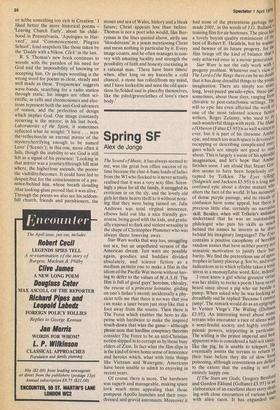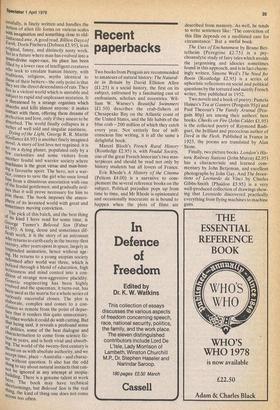Spring SF
Alex de Jonge
The Sound o fMusic, it has always seemed to me, was the great box office success of its time because the char-h-banc loads of ladies from the WI who flocked to it never actually realised that it was a very sexy film. Seemingly a piece for all the family, it smuggled its eroticism in on the sly, and the lovely old girls let their hearts thrill to it without noticing that they were being turned on. Julie Andrews was total virginal innocence, elbows held out like a nice friendly governess, being good with the kids, and gradually exposed to dark and violent sexuality in the shape of Christopher Plummer who was always there lowering away.
Star Wars works that way too, smuggling not sex, but an unpolluted version of the American dream. Just wars are possible again, goodies and baddies divided absolutely, and science fiction as a medium permits one to make a film in the idiom of the Pacific War movie without having to defer to the values of M.A.S.H. The film is full of good guys' heroism, chivalry, the rescue of a princesse lointaine, girding on one's father's sword; incidentally a physicist tells me that there is no way that you can make a laser beam just stop like that a foot away from the source. Then there is The Force which enables the hero to dispense with hardware to make the inspired touch-down that wins the game — although please note that hardline conspiracy theorists consider The Force to be an anti-Christian notion slipped in to corrupt us by those busy elders of Zion. In fact what the film slips in is the kind of down home sense of innocence and heroics which, what with little things like Vietnam and Watergate, Americans have been unable to admit to enjoying in recent years.
Of course there is more. The hardware was superb and manageable, making space look much more appealing than those pompous Apollo launches and their overdressed and gravid astronauts. Moreover it
had none of the pretentious garbage the made 2001, in the words of J.G. Ballard, Ili training film for air hostesses. The piece 110
a lovely boyish quality reminiscent of the best of Robert E. Heinlein, but be warned
and beware of its future progeny, for die film brings off the kind of balance that iS only achieved once in a movie generation. Star Wars is not the only work with 8, progeny problem. Whatever one's view The Lord ofthe Rings there can be no doubt that it has done dreadful things to the young
imagination. There are simply too manY
long, level-paced pseudo-epics, three-Part sometimes, about these days, ranging fruit' chivalric to post-cataclysmic settings. The, will to epic has even affected the work o' one of the most talented science fictio8
writers, Roger Zelazny, who used to
such wonderful things with myth. The Ha'° ofOberon (Faber £3 .95Yis as well written 85 ever, but it is part of his tiresome Amber epic, and much too much space is devoted t° recapping or describing complicated hitt gues which are simply not good to retiv, about. This is largely a waste of his splen0 imagination, and let's hope that Amber finishes soon. I am afraid that Stuart Gov don seems to have been hopelessly cot. rupted by Tolkien. The Eyes trilogYj (Sidgwick and Jackson £5.95) is a long an') confused epic about a divine mutant wit° alters the face of the world. It has moments, of dense purple passage, and its rituals o' confusion have some appeal, but there is precious little else, certainly no narrative skill. Besides, when will Tolkein's imitators understand that he was an outstanding philologist who puts his skills as nittell behind the names he invents as he doe' behind his imaginary languages? The E.Yes contains a positive cacophony of horrible random names that have neither poetry Of semantic motivation to justify their bar. barity. We find the pretentious use of ape's" trophes in funny placee.g. Sos'to, and eve,h indications as to which syllable takes a tort stress in a monosyllabic word, KOr, indeed' I once knew a girl whose greatest virtue was her ability to recite a poem I have never heard since about a pig who sat beside pump. When asked why he was looking s° dreadfully sad he replied 'Because I cannot jump'. The remark would do as an epigraPh to Vernor Vinge's The Willing (Dot's° £3.95). An interesting novel about sonic terrans who encounter a race of aliens With a semi-feudal society and highly evolved psionic powers, teleporting in particular. The witling is the prince imperial and heir apparent who is considered a half-wit since, like the pig, he is unable to teleport. fl eventually assists the terrans to return t° their base before they die of slow focid, poisoning, although conventions are defie° to the extent that the ending is not art entirely happy one. If The Stars are Gods, Gregory Benford and Gordon Eklund (Gollancz £3.95) is aff,
elaboration of an excellent short story dual: ing with close encounters of various kind' with alien races. It has expanded sue
cessfully, is finely written and handles the notion of alien life forms on various scales With imagination and something close to oldfashioned awe. A good read. Billion Days of Earth, Doris Pischera (Dobson £3.95), is an original, funny, and distinctly nasty work. Set in a future where man has evolved into a quasi-divine super-race, his place has been filled by a lower race of intelligent creatures who seek to emulate human history, with traditions, religions, myths identical to til_hose of their betters — the only point is that ii"eY are the direct descendants of rats. They "Vein a violent world which is unstable and s.nbject to rapid and unpleasant mutation: It Is threatened by a strange organism which absorbs and kills almost anyone: it makes contact with them, offering them dreams of Perfection and love, only if they assent to be absorbed. The world finally collapses in a welter of well told and singular nastiness. , Dying of the Light, George R. R. Martin lGollancz £4.95) is another finely imagined °°vel. A story of lost love not regained, it is set on a dying planet, populated only by a few curiosities and some visitors from another feudal and warrior society where nlachismo is the great virtue and man-hunt g a favourite sport. The hero, not a war129r, comes to save the girl who once loved from a disastrous association with one 91the feudal gentlemen, and gradually real!se.s that it will prove necessary for him to Join them. The book imposes the atmos_Phete of its invented world with great and Sometimes moving conviction.
The pick of this batch, and the best thing °f its kind I have read for some time, is
George Turner's Beloved Son (Faber , 40,4.95). A long, dense and sometimes dif"cult work, it is the story of an astronaut who returns to earth early in the twenty-first eentery, after years spent in space, largely in s.usPended animation, hence without ageing. He returns to a young utopian society teformed after world war three, which is Policed through a blend of education, high seriousness and mind control into a contion of strange non-aggressive placidity. `ienetic engineering has been highly evolved and the spaceman, it turns out, has been used as the matrix for a whole series of variously successful clones. The plot is elaborate, complex and comes to a conclusion so remote from the point of departnte that it renders this quite unnecessary. to other worlds it could do with cutting. But that being said, it reveals a profound sense °f Politics, some of the best dialogue and "aracterisation to come from science fict.1°n in years, and is both vivid and absorb The world of the twenty-first century is :ftnat on us with absolute authority, and we `:ceept time, place — Australia — and charactr. without question. It also has the odd ng to say about natural instincts that cannbot be ignored in any attempt at utopiahtiliding. There is a genuine talent at work ere, The book may have technical shortcomings, but Beloved Son is the real tping, the kind of thing one does not come "eloss too often.



































 Previous page
Previous page